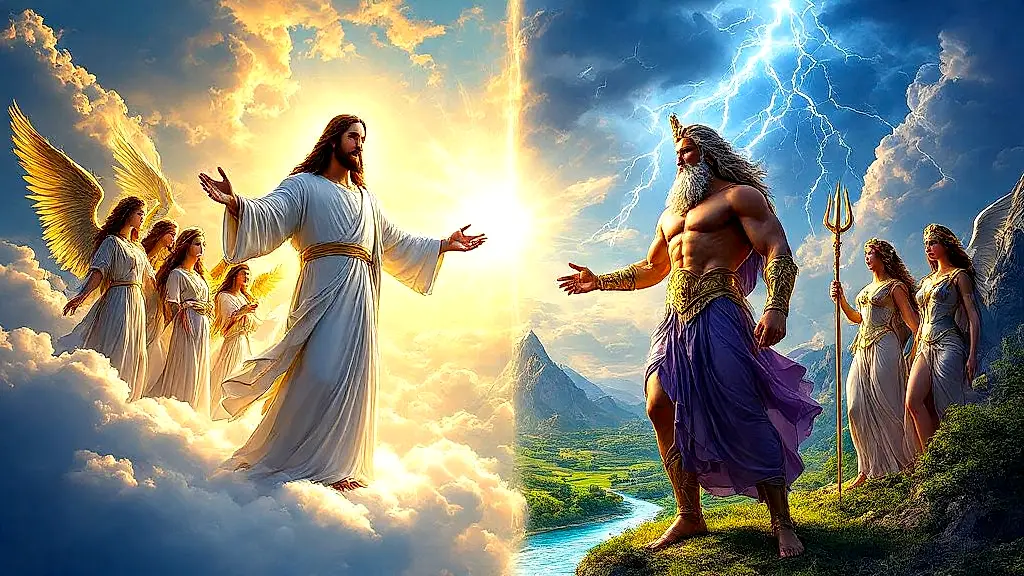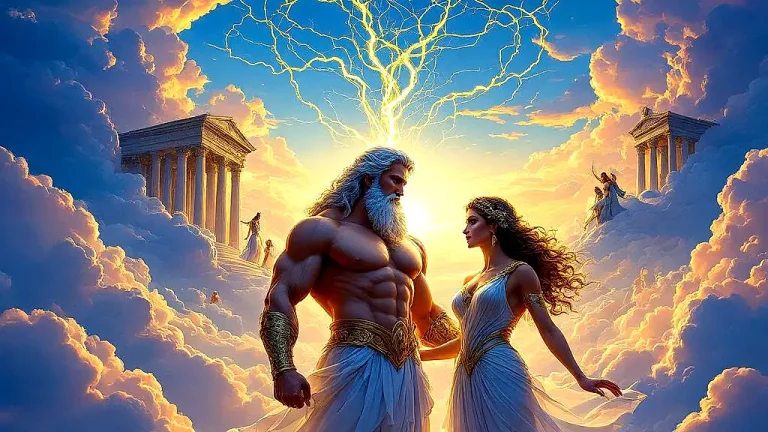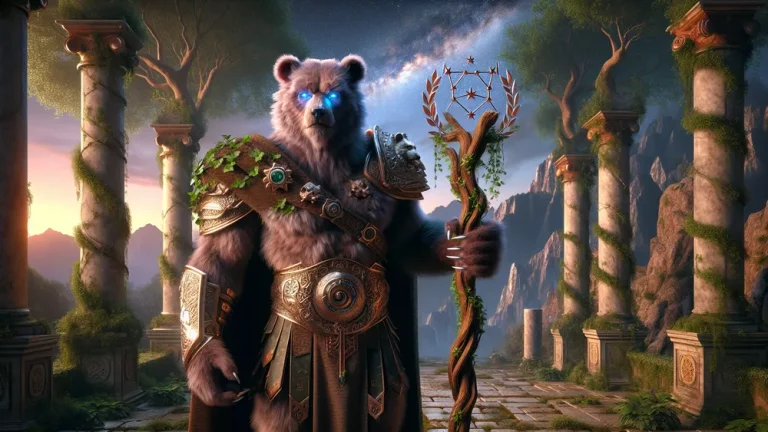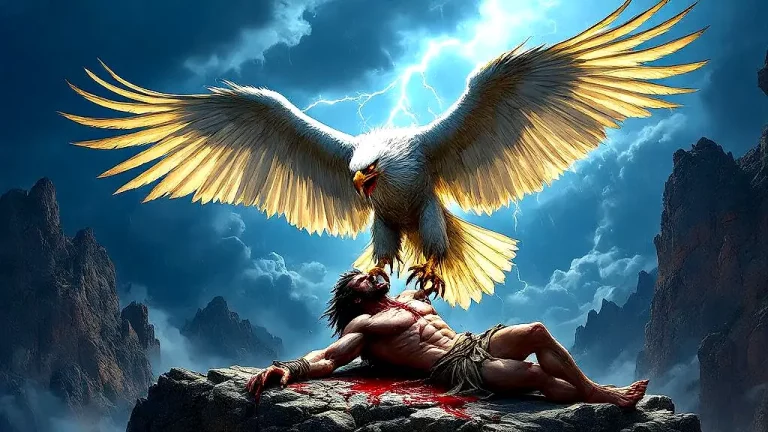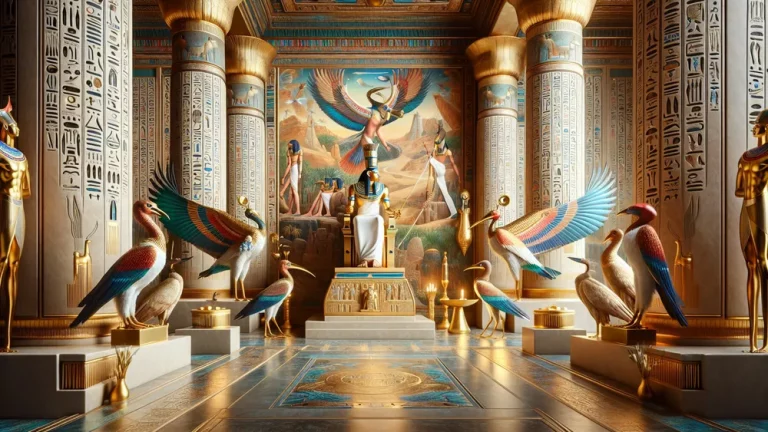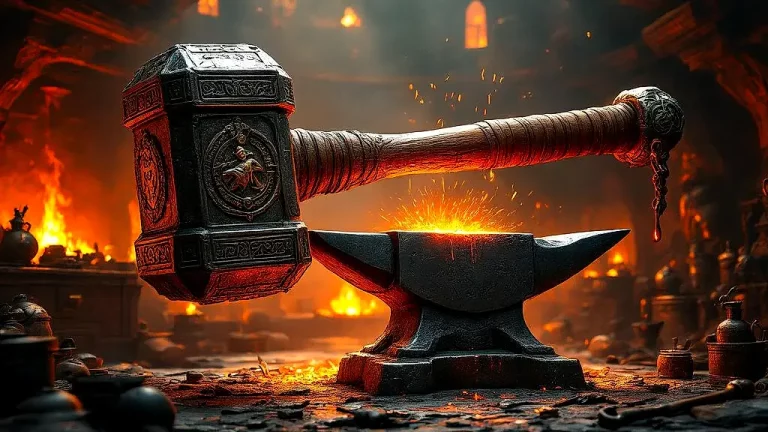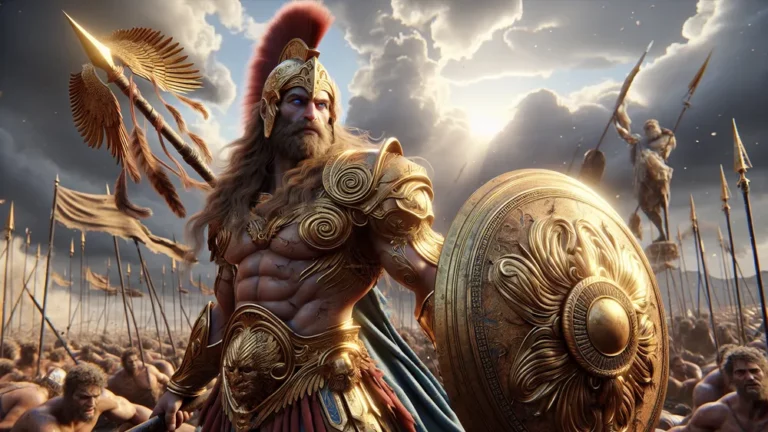Comparing Christianity And Greek Mythology: Key Differences
Have you ever thought about how the ancient Greeks explained thunderstorms? Or why Christianity teaches that a single God made everything? These ideas come from very different times. Yet, both belief systems deeply influenced how people lived, offering contrasting answers to life’s biggest questions. In this deep dive, we’ll compare structured monotheism – the belief in one all-powerful God – with Greek mythology’s chaotic world of gods.
Key Points:
- Christianity believes in one all-powerful God, while Greek myths have many gods who act like humans.
- The Christian creation story is orderly and planned, but Greek myths start with chaos and family fights.
- Christians think humans should follow God’s rules, but Greek heroes often challenge the gods for glory.
- After death, Christianity promises heaven or hell, while Greek myths say most souls go to a shadowy underworld.
- The Bible gives clear moral rules, but Greek gods change their minds, making right and wrong unclear.
- Jesus sacrificed himself to save people, unlike Greek heroes who sought fame through strength and cleverness.
- Christianity grew by offering hope and community, while Greek gods lost power as people turned to new beliefs.
Zeus threw lightning bolts, and Athena gave wisdom, but they also fought like humans. We’ll look at how they explained the world’s beginning. Then, we’ll compare their rules for living and what they believed happened after death. You’ll see how Christianity’s orderly universe in Genesis differs from the Greek underworld’s gloomy rivers. Heroes like Jesus, who died for humanity, stand apart from demigods like Heracles, who fought monsters for fame.
Whether you’re new to mythology or revisiting these stories, you’ll see why they still fascinate people. Their influence hasn’t faded. Let’s start with their core beliefs: one perfect God versus a family of flawed, powerful beings.
Christianity And Greek Mythology: Overview and Key Facts
| Aspect | Christianity | Greek Mythology |
|---|---|---|
| Type of Belief | Monotheism (one God: Yahweh). | Polytheism (many gods, like Zeus and Athena). |
| Deity Traits | All-powerful, all-knowing, and never-changing. The Trinity includes the Father, Son (Jesus), and Holy Spirit. | Gods acted like humans: Zeus cheated, Hera got jealous. Each god controlled a specific part of life, like Poseidon commanding the seas. |
| Creation Story | Genesis: God made the world in 7 days. Humans (Adam and Eve) were created to resemble Him. | First came Chaos, then the Titans, and finally the Olympian gods. Uranus was overthrown by Cronus, who later lost to Zeus. Some versions, like the Orphic cosmogony, tell it differently. |
| Human Purpose | To serve God and avoid sin. Adam’s fall led to the need for salvation through Jesus. | To seek glory and avoid arrogance. Zeus was furious when Prometheus stole fire for humans. Later, Pandora’s box became the source of human suffering. |
| Afterlife | Heaven (eternal reward) or Hell (punishment). The faithful are resurrected. | Underworld (Hades): Heroes went to Elysium, sinners to Tartarus. Most souls faded away in Asphodel. |
| Moral Authority | God’s commandments (like the Ten Commandments). Sin means disobeying Him. | Justice relied on fate (moira) or whatever mood the gods were in. Courage was admired, but even the gods could be unfair. |
| Key Figures | Jesus (who died to save humanity), prophets like Moses and Paul. | Heroes (Heracles, Perseus), tricksters (Hermes), and titans (Atlas). |
| Historical Spread | Missionaries carried it across regions. Rome adopted it under Constantine in the 4th century CE. | It lost influence after Rome conquered Greece in 146 BCE, and eventually merged with Roman beliefs. |
Key Beliefs: Many Gods or One?
Let’s look at what’s most important in these religions. Christianity centers on one supreme God, while the Greek gods formed a large family that often fought with each other.
Yahweh: All-Powerful and Three-in-One
The Christian God Yahweh is the one and only supreme being. His name means “I AM WHO I AM” in Hebrew (Exodus 3:14). He exists beyond all human limits as omnipotent (all-powerful), omniscient (all-knowing), and present everywhere at once. Unlike Greek gods who each controlled specific areas, Yahweh controls all of creation, morality, and time itself (Isaiah 40:28).
Christians believe in the Trinity, which describes one God in three equal parts: the Father (creator), the Son (Jesus as God in human form), and the Holy Spirit (God’s active presence in the world). This comes from Jesus’s words in Matthew 28:19. While Greek gods could lose fights or be tricked, Yahweh’s power has no limits. His nature never changes (Malachi 3:6), unlike Zeus whose moods shifted constantly.
Everything in creation – from the universe to individual lives – follows Yahweh’s plan. This makes Him completely different from Greek gods, who often fought each other and were limited by forces like the Fates.
Yahweh is the unchanging, all-powerful God who controls everything, unlike Greek gods who had limits and fought each other.
Greek Pantheon: Gods with Problems
Unlike Yahweh, the Greek gods were human-like beings with superhuman powers and very human flaws. They ruled from Mount Olympus, each controlling different parts of the world while struggling with personal weaknesses. The Olympians had specialized powers but acted like flawed humans. Zeus was king of the gods and controlled the sky, but couldn’t stay faithful to his wife Hera. Hera protected marriage but constantly punished Zeus’s lovers.
Their stories, which writers like Hesiod recorded in Theogony, were both religious teachings and warnings about power’s dangers.
Here’s how the main gods ruled and what problems they had:
- Zeus: Sky and justice god who kept having affairs
- Hera: Marriage goddess who took revenge on Zeus’s lovers
- Poseidon: Sea god known for his violent anger
- Athena: Wisdom goddess who played favorites
- Apollo: Sun god whose prophecies confused people
- Artemis: Huntress who severely punished disrespect
- Ares: War god who loved violence
- Aphrodite: Love goddess who caused dangerous passions
- Hephaestus: Master blacksmith who others mocked
- Hermes: Messenger god who helped thieves
These flawed gods showed Greek values – they prized excellence but understood even powerful beings struggled with jealousy, pride, and desire. Next we’ll see how Norse gods were even more unpredictable.
Norse Parallels: Fate and Chaos
Greek gods kept the world running, despite their personal problems. The Norse, however, saw chaos as normal in their mythology. Even Odin, their chief god, went to extreme lengths for wisdom – he hung himself on Yggdrasil (the world tree) for nine nights. The Norse universe worked in cycles that always ended.
The Norns, who controlled fate, had already decided Ragnarök would happen – the final battle where most gods would die. Unlike Zeus who simply ruled, Odin spent his time preparing for this end. He gathered dead warriors in Valhalla for the coming fight. Loki wasn’t purely evil, but a troublemaker who caused problems that eventually led to necessary changes.
While Greek heroes often fell because of too much pride, Norse stories showed even gods couldn’t escape wyrd (fate). This made their fight against the inevitable seem more heroic.

How the World Began: Order or Chaos?
We’ve seen how different religions view divine power. Now let’s look at their creation stories, where Christianity describes a planned creation while Greek myths tell of chaotic beginnings.
Genesis: God’s Plan and the First Humans
The Genesis creation story shows a clear difference from chaotic origin myths. It presents God as the all-powerful creator who brings order by speaking. The world was made in six days, with each step carefully planned. First came light and darkness on day one. Then on day three, God separated land from sea.
Humans were made on day six as the final and most important creation. The story keeps saying “God saw that it was good,” showing this was all intentional. Humans were created in God’s image (imago Dei), which means they received minds, morals, and responsibility for the world. Genesis chapter 2 gives a closer look at creation. God personally made Adam from dirt and Eve from his rib.
He placed them in the Garden of Eden with just one rule: don’t eat from the Tree of Knowledge. When the snake tricked Eve into eating the fruit, and Adam joined her, everything changed. Their sudden shame about being naked marked the beginning of human awareness – and their broken relationship with God.
Unlike Greek stories where gods cause human suffering, here trouble comes from human choice. This introduces the idea of original sin, which becomes important later in Christian teachings. The story moves from perfect creation to human disobedience, showing a world where choices matter deeply.
Greek Cosmogony: Titans and the Void
While Genesis shows one god creating order, Greek myths begin with Chaos – not just empty space, but a void full of possibilities. From this came the first beings: Gaia as earth, Tartarus as the underworld, and Eros as desire. Unlike the planned creation in Genesis, the Greek universe formed through violence. When Uranus (the sky) wouldn’t let his Titan children be born, Gaia gave their youngest Cronus a sickle.
He cut off his father’s genitals, and the blood created more creatures. This shows how Greek creation was messy and ongoing, not neat and finished. Cronus ruled next, but ate his own children when he heard one would overthrow him. His wife Rhea tricked him by hiding their son Zeus. When Zeus grew up, he led the Olympians in the Titanomachy, a ten-year war against the Titans.
Their victory made the Olympians the new rulers. Greek creation lacks an all-powerful maker. Instead, the universe organizes itself through conflict and family drama. While Genesis tells of perfection lost, Greek myths show a rough world slowly improving through godly battles. The Titans represent basic natural forces, while Olympians like Athena and Apollo stand for human things like wisdom and art.
These stories mirror how the Greeks saw nature – always changing, with new life coming from destruction.
Greek creation starts with Chaos and unfolds through violent clashes among gods, where new rulers emerge from battles and the world slowly gets better through conflict.
Human Purpose: Follow or Strive?
These different creation stories show two views of human purpose. Should humans follow God’s rules like in Genesis, or push boundaries like Prometheus did? The two traditions show completely different answers.
Original Sin and Jesus’ Rescue
The Genesis story changes completely when Adam and Eve disobey God. Their act brought original sin into the world, which affected all people born after them. They lost both their home and their close relationship with God. Early Christian thinkers like Augustine taught that everyone inherits this flawed nature from humanity’s first act of disobedience. But Christianity says Jesus provides the solution.
As God in human form, he came as the “second Adam”. While the first Adam brought death through sin, Jesus brought life through perfect obedience to God. The crucifixion marks the key moment of forgiveness. When Jesus died, he took the punishment for human wrongdoing. Three days later, his resurrection proved he had beaten sin and death.
This gives Christians hope that people can be right with God again. Unlike Greek hero stories that depend on human strength, this rescue comes from God’s kindness. It’s offered to anyone who accepts it, not earned through good deeds.
Greek Hubris: Prometheus and Pandora
Unlike Christianity’s story of human failure, Greek myths show Prometheus helping humans by defying the gods. His theft of fire from Olympus was an act of hubris – arrogance toward the gods – with both good and bad results. Prometheus stole fire from the gods and gave it to humans, which was like giving children tools they weren’t ready to use.
For this, Zeus punished him by chaining him to a rock where an eagle ate his liver every day. Then Zeus ordered Hephaestus to make Pandora, the first woman. She was created as a deceptive present for humanity. Pandora received a jar that held all human suffering, and when she opened it, she released diseases and problems into the world. Only hope remained inside.
This explains suffering differently than the Christian Fall – here, pain comes from the gods’ anger, not human mistakes. The story also shows how Greeks saw women as attractive yet potentially dangerous. Unlike Christianity’s offer of salvation, Greek myths provide no way to undo what Prometheus did. His endless punishment and humanity’s never-ending troubles became the cost of knowledge and progress.
While Christianity promises things will be made right, Greek mythology presents a world where humans must live with the gods’ anger forever. These stories suggest that opposing the gods brings both progress and punishment – a serious way of thinking where heroes like Prometheus are honored for their suffering, not saved from it.
Life After Death: Hope or Darkness?
These different beliefs about human purpose make us look at what each tradition says happens after death. While Christianity teaches about heaven, Greek mythology describes a shadowy underworld. The two traditions have very different answers about what comes next.
Christian Heaven, Hell, and Rising Again
Christian teachings about the end times describe a final outcome where believers look forward to heaven. This isn’t just a place, but perfect closeness with God, which Revelation calls a shining city. Christians believe they will stand before God with physical bodies, not as spirits without form. This bodily resurrection was first shown when Jesus rose from the dead.
Heaven isn’t about just sitting around playing music, but about directly experiencing God and being fully known by him. Unlike Greek ideas of the afterlife, Christianity promises creation’s final fulfillment where suffering ends completely. However, Christianity also teaches about hell. The Bible describes it as both fire and darkness, showing complete separation from God.
Early Christians disagreed about whether hell lasts forever or ends in destruction, but all agreed it comes from refusing God’s mercy. The resurrection doesn’t mean everyone is saved, since Jesus spoke about a particular judgment that separates believers from unbelievers. While hell is severe, it shows Christianity’s strong belief that death isn’t the end. Physical death leads either to being with God or separated from him forever.
Greek Underworld: Elysium and Tartarus
The Greek underworld, called Hades, was a huge underground place which was ruled by the god Hades and his wife Persephone. Unlike Christianity’s simple heaven and hell, it had three main areas: the dull Asphodel Meadows for regular people, the pleasant Elysium Fields for heroes, and the painful Tartarus for criminals and enemies of the gods.
Most ordinary souls went to the Asphodel Meadows, where they wandered without purpose, while special people enjoyed Elysium and the worst suffered in Tartarus. The story of Orpheus shows how strict these rules were – not even a god’s music could change them. Where you went after death depended on what you did in life, but also on whether the gods liked you and if you got proper burial.
Three judges decided each soul’s fate, though early stories say nearly everyone ended up in the same shadowy place. Later writings made Elysium better, saying good souls there could be reborn. Meanwhile, Tartarus held famous prisoners like the Titans and people such as Sisyphus, who always had to push a rock uphill, and Tantalus, who could never reach food or water.
The Greek underworld was very different from Christian ideas because it offered no second chances. While some religious groups promised better treatment, most Greeks believed death permanently weakened people. Even heroes in Elysium couldn’t return to life, and the dead needed living relatives to bring offerings so they wouldn’t be completely forgotten. This shows how Greeks saw human life as limited, with the afterlife being much weaker than when they were alive.
How Gods Decide Right and Wrong
Now that we’ve looked at the afterlife, we need to understand what decides where people go. This leads us to examine how different religions determine right from wrong based on what their gods consider good behavior.
Biblical Rules and Sin
The Ten Commandments (Exodus 20:1-17) form the foundation of biblical morality, showing God’s basic rules for how people should live. Unlike Greek gods who often acted unfairly, the Bible presents God as having perfect moral standards, where sin means breaking these rules through actions like stealing or wrong desires like jealousy.
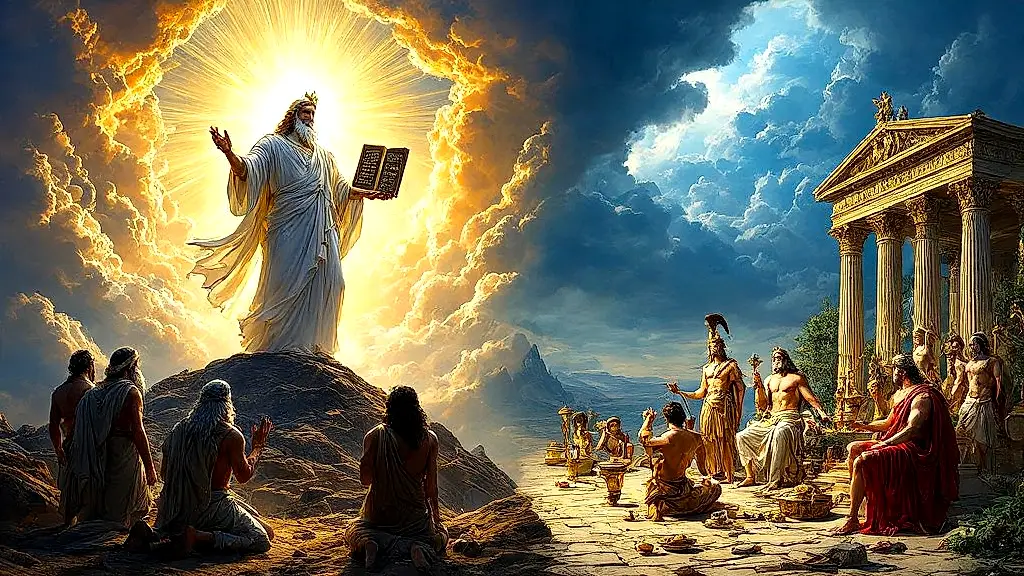
Later prophets explained these laws weren’t just about rituals but required genuine change in how people think and act. This developed into Jesus’ teaching that God sees wrongful anger as serious as killing. In this system, sin isn’t just mistakes but rejecting God’s authority, which requires making things right between people and God – unlike Greek religion where people just traded favors with gods.
The Ten Commandments set clear moral rules from God, focusing on right living and inner change rather than empty rituals.
Greek Virtue: Fate and Gods’ Moods
Greek morality was caught between unchangeable fate and the unpredictable decisions of the gods. Even Zeus couldn’t change what fate had decided, though the Olympians often punished humans for doing things the gods themselves did. The worst offense was hubris – extreme arrogance that upset the natural order and always brought nemesis (punishment from gods), like when Arachne foolishly challenged Athena.
Unlike the Bible’s clear rules, Greek virtue (aretē) meant keeping balance and not going too far, summed up by the saying “nothing in excess.”
| Concept | Greek View | Biblical View |
|---|---|---|
| Moral Law | Changed with gods’ moods | Always stayed the same |
| Justice | Often unfair | Always fair |
| Fate | Couldn’t be avoided | God’s plan with human choice |
| Sin | Arrogance/imbalance | Breaking God’s rules |
This system made ethics uncertain – how could you do right when gods changed their minds? While the Bible offered forgiveness, Greek myths showed permanent results, like Oedipus’s accidental crimes still destroying him.
The Furies punished bloodshed whether meant or not, unlike biblical ideas about intentions. Even good people suffered if gods grew jealous, so Greek ethics was more about avoiding mistakes than becoming better.
Heroes and Saviors: Jesus vs. Demigods
Now that we’ve seen how these belief systems differ, we can compare their most important figures. This means looking at Jesus and the Greek demigods to understand what each religion valued most.
Jesus: Miracles and Dying for Us
The Gospels show Jesus’ miracles as proof that God’s kingdom was active in the world. When he healed blind people or stopped storms, these weren’t just powerful acts but showed God’s care and control over nature.
Unlike Greek heroes who did amazing things for fame, Jesus’ greatest action was choosing to die, which Philippians 2:5-8 calls the greatest humble act – God choosing to die as a human. The crucifixion shows Christianity’s unique message: while Greek heroes won through power, Jesus won through sacrifice. This is called atonement, meaning God and people becoming united.
His resurrection three days later was different from mythical stories of coming back to life – it began God’s new work in the world, with multiple witnesses reporting the empty tomb. Demigods like Heracles became gods by doing great deeds, but the New Testament shows Jesus was always God who became human to save us – something Greek myths never imagined.
Greek Heroes: Heracles and Theseus
Greek heroes like Heracles and Theseus were completely unlike Jesus in important ways. While Jesus sacrificed himself, these demigods sought kleos (eternal fame) through amazing deeds. Heracles, who was Zeus’s son with a human woman, did twelve famous labors as punishment for killing his family during a madness sent by gods – very different from Jesus, who never sinned.
Theseus, Athens’ legendary king, he meant well but also made questionable choices; he killed the Minotaur but later left Ariadne behind. Their lives typically included certain patterns: divine parents, great challenges, and often sad endings before becoming gods. What’s interesting is how human these heroes were – both more powerful and more flawed than regular people.
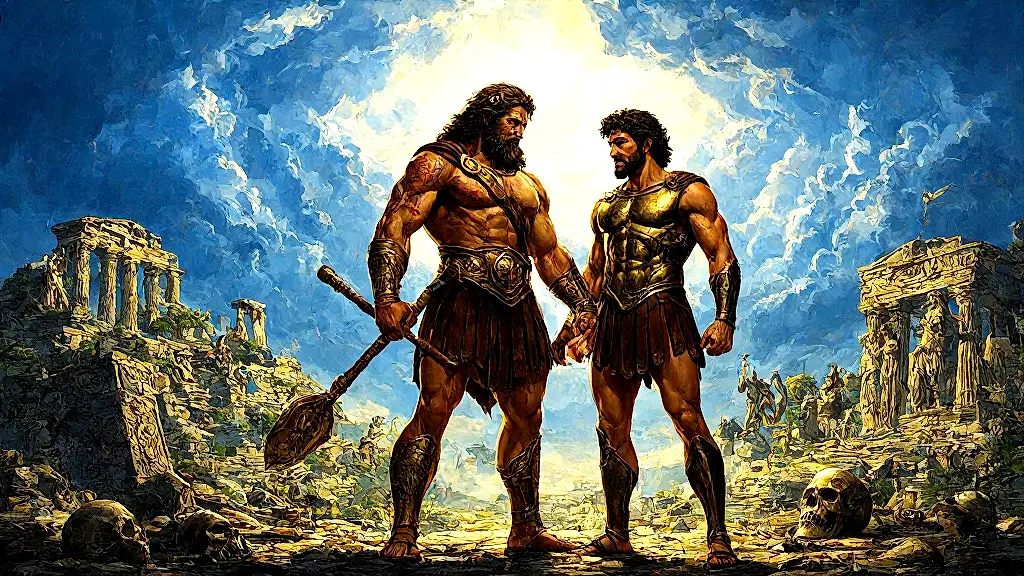
When Heracles wore the Nemean Lion’s skin that couldn’t be harmed, or Theseus found his way through the Labyrinth, they showed the Greek idea of arete (being excellent). But unlike Jesus who helped others, their victories mostly helped themselves, which made them famous forever rather than saving everyone.
Even how they became gods differed from Jesus’ resurrection; Heracles earned godhood through his labors, while Theseus mainly got worshipped in Athens.
Other major Greek heroes include:
- Perseus: Killed Medusa, born when Zeus came as golden rain
- Achilles: Nearly unbeatable warrior (except his heel) in the Trojan War
- Odysseus: Clever hero of the Odyssey known for tricks
- Jason: Led the Argonauts to find the Golden Fleece
- Bellerophon: Rode Pegasus but flew too near the gods’ home
Each shows different Greek hero qualities, from strength to smarts, but all demonstrate what humans could do – and couldn’t do. People told these stories to feel amazed, not to copy them morally, which contrasts with Jesus telling people to “follow me.”
Faiths Collide: When Christianity Met Paganism
As Christianity reached different parts of the Roman Empire, its very different ideas about gods naturally caused disagreements with pagan beliefs. This clash between religions changed European culture permanently.
Early Christians Under Attack
Early Christians were often blamed for disasters they didn’t cause, like when Nero punished them after Rome’s fire in 64 AD. Tacitus wrote about this Neronian Persecution in his Annals (15.44). Because Christians refused to worship Roman gods, officials saw them as atheists who angered Rome’s gods (pax deorum).
Many believers died brutally – some were set on fire at night to light streets, while others were killed by wild animals in arenas. However, attacks didn’t happen all the time. Some governors like Pliny the Younger even asked Rome what to do about Christians.
But when emperors like Decius and Diocletian ordered everyone to sacrifice to pagan gods, Christians who refused faced death. This suffering developed the important idea of martyrdom that became central to Christian identity.
Early Christians faced brutal punishments like being burned alive or killed by animals because they refused to worship Roman gods, shaping their strong belief in martyrdom.
How Christianity Beat the Old Gods
Christianity grew from a persecuted group to Rome’s official religion starting with Emperor Constantine. Before the Battle of Milvian Bridge in 312 AD, he had a vision that led to the Edict of Milan in 313 AD, which allowed religious freedom. Unlike Greek gods that required rituals, Christianity offered direct connection to God, life after death, and communities that helped widows and poor people.
These practical advantages encouraged people to convert even without government orders. Meanwhile, Christians adapted pagan traditions, like celebrating Christmas near winter solstice, making the religious shift easier for many. Their organized system also matched Rome’s efficient government. The Theodosian Decrees in the 380s AD declared Christianity the state religion and outlawed pagan sacrifices. The Parthenon, once Athena’s temple, became a church with its statues changed to fit Christian beliefs.
Rural areas (called paganus in Latin) kept old traditions longer, but Christianity’s official status, social benefits for converts, and ability to adapt proved stronger than ancient myths. The old gods gradually became part of folk traditions rather than active religious figures.
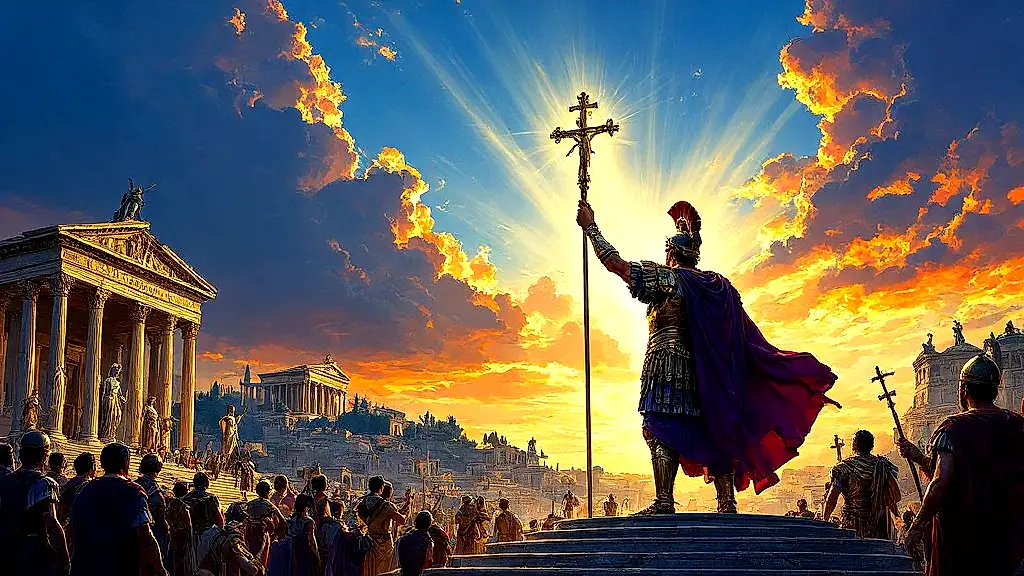
FAQs
1. Why is Greek mythology myth but Christianity religion?
Greek mythology is classified as “myth” but Christianity as “religion” because the former is an ancient, non-practiced belief system, while the latter remains an active, organized faith with living adherents.
2. Did Christianity borrow elements from Greek myths?
Christianity did borrow certain elements from Greek myths, particularly in early theological symbolism and artistic representations.
3. How did Greek myths influence early Christian art?
Greek myths influenced early Christian art by providing stylistic models, such as the depiction of Christ as a shepherd resembling Hermes Kriophoros.
4. Why did people abandon Greek gods for Christianity?
People abandoned Greek gods for Christianity primarily because its message of universal salvation and monotheistic structure offered a more cohesive spiritual framework than the fragmented, morally ambiguous pantheon.

